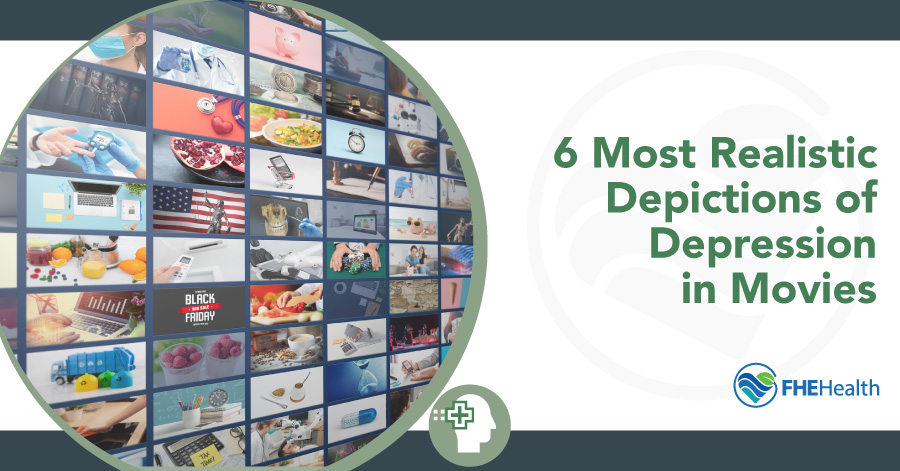
According to the World Health Organization, depression affects more than 264 million people worldwide. In the United States, it affects about 7.1% of the adult population. Although movies are meant to entertain, they also play an important role in educating viewers. The following movies about depression help audience members understand what it’s like to live with depression. They also show viewers how depression can affect an individual’s relationships with others.
1. The Skeleton Twins
Bill Hader and Kristen Wiig are known for portraying comedic characters on Saturday Night Live, so many moviegoers were surprised to see them starring as depressed siblings in The Skeleton Twins. In the film’s opening scene, Hader’s character (Milo Dean) attempts suicide. What’s even more shocking is that his sister, Maggie Dean, was also planning to end her own life. The only reason she didn’t go through with it is that she received a telephone call informing her of Milo’s hospital admission.
The Skeleton Twins is one of the most realistic movies about depression because it shows that people with depression have ups and downs just like everyone else. Even though Milo and Maggie both have depression, the movie has several lighthearted moments. This shows that many people with depression are capable of telling jokes and having fun with their loved ones even when they’re hurting inside. Finally, The Skeleton Twins uses the suicide of the protagonists’ father to remind the audience that depression often runs in families.
2. Melancholia
Melancholia has a reputation as one of the best movies about depression because it doesn’t stigmatize the disorder or minimize its symptoms. Instead, the film offers a stunningly realistic portrayal of how depression symptoms can affect every aspect of a person’s life. Even though Justine is a beautiful woman marrying into a wealthy family, her depression symptoms don’t go away just because it’s her wedding day. The film shows viewers that depression can affect everything from a much-anticipated wedding to the birth of a child or a long-awaited graduation ceremony.
Melancholia also deserves to be on this list for showing viewers that depression symptoms don’t always appear for a specific reason. Many movies about suicide and depression feature some kind of trigger event, such as a serious illness. Melancholia shows viewers that depression symptoms can set in for no particular reason.
3. Cake
Like Hader and Wiig, Jennifer Aniston is known for roles in comedies, such as Friends, Horrible Bosses and Office Christmas Party. Her transformation from the bubbly Rachel Greene to Claire Simmons, a woman suffering from chronic pain and depression, took viewers by surprise. Simmons suffers from chronic pain due to an auto accident, but she’s also struggling with grief after the death of her son.
Cake is one of the best films about depression because it shows the psychological effects that chronic pain can have. It also educates viewers on the grief process and helps people understand that grief can sometimes turn into a depressive disorder. In Cake, Claire is kicked out of a support group due to her behavior, and her personal relationships are suffering. Claire’s depression symptoms also make it difficult to open up to the people in her life.
4. Little Miss Sunshine
Although Little Miss Sunshine has amusing moments, it also offers a realistic depiction of depression. Frank, Olive’s uncle, recently attempted suicide after a difficult breakup. His ex-partner has moved on with someone who’s more attractive and more successful, making Frank feel like a loser. These details make the audience empathize with Frank, but then the film goes one step further.
As the film progresses, viewers realize that Frank can’t have a healthy relationship until he addresses his depression. It becomes clear he was using his relationship with a student to ignore his symptoms. Only after the breakup could he truly focus on his mental health and develop better coping mechanisms. This is what makes Little Miss Sunshine one of the best movies about depression in the last 20 years.
5. Garden State
Billed as a romantic comedy, Garden State can also be classified as a movie on depression. The main character, Andrew Largeman, returns to his hometown after the unexpected death of his mother. He’s recently stopped taking his medications and is now having headaches that won’t go away.
Garden State is one of the best movies about depression because it shows viewers how the wrong treatment can make depression even worse. When Andrew was a child, he pushed his mother, an incident that caused her to become paraplegic. As a result, his father forced him to take antidepressants and mood stabilizers. These drugs made it impossible for Andrew to express his emotions, leaving him worse off than he might have been without medication.
6. After Jimmy
Like Cake, After Jimmy demonstrates how grief can eventually lead to persistent depression. Maggie and Sam Stapp are parents grieving the loss of their oldest son by suicide. While Sam isn’t afraid to talk about his feelings, Maggie does everything she can to avoid the topic. Their different approaches to grieving put Maggie and Sam at odds when they need each other the most.
After Jimmy is one of the most realistic depression movies because it shows Maggie moving through the five stages of grief. At first, she denies that her son has died by suicide. Then she’s angry that none of his teachers told her what was going on. Eventually, she accepts that he’s gone, although not before her depression threatens her marriage. More than 800,000 people die by suicide each year, making After Jimmy an important educational tool.
Get Help with Depression
If your depression is making it difficult to get through the day, help is available. FHE Health has experienced, compassionate counselors on hand to assess your physical and psychological symptoms. For more information on how we can help, call FHE Health at (833) 596-3502. We’re here 24/7 to help you get your life back on track.






